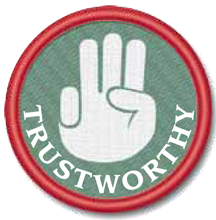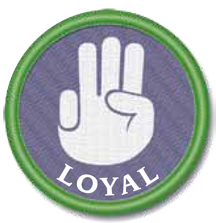The Factory Sales Guy
Reps should be trustworthy, helpful, loyal and knowledgeable
by Frank Hurtte

I am continuing the journey of coaching some of our field salespeople on what a distributor salesperson wants from a factory salesperson. Do you have any references, articles or anything that might be pertinent?
Try as I might, I could not find any reasonably sound advice for our kind of selling efforts. The few articles I did locate seemed to be one-sided in their tone. With this in mind, let’s take the next six minutes to explore the topic from both sides.
While I was never allowed into the organization, I’ve heard the Boy Scout credo at least a million times. The Scouting motto states a good scout must be: Trustworthy, Helpful, Loyal and about a dozen other things. Stating the obvious, a good factory salesperson should mirror those traits. Strangely, many fail this simple test.
A factory sales guy should be trustworthy Everyone thinks of themselves as trustworthy, so let’s get specific. Trust can be as simple as honoring time commitments. If you say you’ll be back on Tuesday, be there. If you are unable to resolve an issue by Tuesday as promised, call or email with an update of the situation and a new deadline. Here’s why: Distributor sellers work very hard to develop trust with their customers. Statistically, distributor guys work in the same geographic market for far longer than their manufacturer counterparts, who are often transferred or promoted to new responsibilities. Each commitment the factory guy doesn’t keep spills over to their reputation. Of course, dependability doesn’t stop here.
Everyone thinks of themselves as trustworthy, so let’s get specific. Trust can be as simple as honoring time commitments. If you say you’ll be back on Tuesday, be there. If you are unable to resolve an issue by Tuesday as promised, call or email with an update of the situation and a new deadline. Here’s why: Distributor sellers work very hard to develop trust with their customers. Statistically, distributor guys work in the same geographic market for far longer than their manufacturer counterparts, who are often transferred or promoted to new responsibilities. Each commitment the factory guy doesn’t keep spills over to their reputation. Of course, dependability doesn’t stop here.
Trustworthiness extends to other areas of business such as, for instance, customer contacts. A distributor salesperson spends years building trust with customers. Their list of friends is the most important part of their personal business. Each time they introduce you to their top customer they risk their relationship based on how you handle the information.
Pushing this customer contact information further, good distributor account managers have a plan for developing their customers. Based on competitive activity, buying behaviors or internal politics, their plan may have a priority and timeline for new product introduction. It is important for the factory salesperson to talk about new products in the overall construct of their longer-term plan. There will be disagreements. When those happen, communicate and convince rather than do an end around.
While joint sales calls are important, the practice is time-consuming and expensive. Most reasonable people believe factory guys should make sales calls on their own, but sometimes the practice leads to doubt and distrust. Distributor salespeople hate surprises at their accounts. A quick message ahead of and following the call to alert the distributor to your planned activity and call results effectively eliminates surprises and allows for better long-term results.
A factory sales guy should be helpful Keeping with the topic of joint calls, a factory salesperson can be helpful by assisting in the setup of sales calls. In today’s business environment, setting appointments is tough and time consuming. At the same time, many factory guys push this task to the distributor salesperson. What’s worse, they often complain to management when their days are not fully utilized.
Keeping with the topic of joint calls, a factory salesperson can be helpful by assisting in the setup of sales calls. In today’s business environment, setting appointments is tough and time consuming. At the same time, many factory guys push this task to the distributor salesperson. What’s worse, they often complain to management when their days are not fully utilized.
If the factory person happens to represent a major company with large market presence, this perceived status can and should be used to open doors for the distributor. Factory types may also be privy to information unavailable yet valuable to the local distributor salesperson. This might be a visiting engineer from the customer’s headquarters or a project underway at some sister plant. This information is very helpful to formulating strategies for both sellers.
Leads are important to the distributor sales guy. Oftentimes, the practice is for factory people to personally track down the leads and discard if they don’t see an immediate opportunity. The factories of today are hard to maneuver when contrasted with the industrial facilities of just a decade ago. It’s hard to meet people. Each of those leads, even if they don’t purchase the manufacturer’s product, has value to the distributor based on their need to sell a complete offering of products.
Demos and presentations have become increasingly important to the sales effort of most of our products. However, some distributors struggle to keep their cost of demos up to date. Further, many distributor salespeople lack the product know-how and confidence to develop their own presentations. Here, the factory seller can provide great assistance by providing not only a fancy demo case, but also a sample outline of what they feel are important for a decent presentation.
While we are on the topic of hardware to show the customer, let’s talk about samples. Many factory people automatically assume their distribution counterpart can simply walk into the warehouse and easily grab whatever samples are needed. They can’t; inventory management techniques and other best practices in distribution make it exceedingly hard to get samples for even the best customers. There are tons of hurdles and the process can take weeks. If you are a factory person, help your allies to help you; find a way to get them samples.
A good factory guy is loyal Loyalty means sticking with your distributor sales friend, even when a mutual customer says, “We would like to explore the opportunity to pursue a closer relationship with your company. And, buy direct.” First, this line is straight from Purchasing Department Book of Tricks 101. Secondly, unless the volume and order status of the account fits exactly with your factory’s production capabilities, going direct probably doesn’t make sense.
Loyalty means sticking with your distributor sales friend, even when a mutual customer says, “We would like to explore the opportunity to pursue a closer relationship with your company. And, buy direct.” First, this line is straight from Purchasing Department Book of Tricks 101. Secondly, unless the volume and order status of the account fits exactly with your factory’s production capabilities, going direct probably doesn’t make sense.
Sticking with the direct thing for just a moment, I realize there are sectors of the market where orders are placed and business is done direct. Casts of thousands have already debated the issue, so we’re not going there in our discussion. But, and this is a major point, distributors need to understand and be able to predict your behavior ahead of the situation. It’s a difficult situation and one best discussed now rather than the day after you receive the first direct order.
Let’s do the Lightning Round
Time and space prohibit long detailed discussion on every point. To make the best use of our time together, let’s do a “lightning round” of other thoughts on what makes a great factory sales guy:
 Knowledge of the industry: A good factory salesperson should have a knowledge of the industry which includes not only product technologies, but also competitive landscape and application knowledge. This might be tough on newbie sales types, who need to find others to call in when needed.
Knowledge of the industry: A good factory salesperson should have a knowledge of the industry which includes not only product technologies, but also competitive landscape and application knowledge. This might be tough on newbie sales types, who need to find others to call in when needed.
Training: Distributors under your charge should expect solid training on product technology as well as how to sell your products. Further, the training for inside sales departments will differ from that provided to outside sales. Outside team members need extensive application training, how to find the right customer and product target information. Inside people need to understand how to maneuver through your catalog and who to call if they have a delivery or expediting issue.
Target accounts: Setting the right target customers to attack should be one of the top priorities of training and other selling activities. A good factory guy understands his distributor counterparts have more products to sell than time. Picking and choosing the opportunities with the greatest chances of success makes your product line more valuable to the distributor organization. Personalizing the approach by mutually selecting the right targets is exceedingly helpful.
Opportunity tracking: Progressive distributors are all over this one; the other 80 percent often handle the task informally, if at all. Factory salespeople who are fully engaged get involved with the situation. They periodically work through the list of pending opportunities to determine if there are obstacles that can be jointly attacked. The smartest factory folk not only track their company’s portion of the opportunity, they capitalize on the ancillary business which comes along with the sale of their own products.
Proactive engagement and planning: Many manufacturers establish some kind of sales plan each year. Sadly, most put it on a shelf and never revisit it until 12 months later. Plans should be reviewed on a regular basis and extended down to the salespeople you deal with on a regular basis. A good plan includes activities such as open houses, customer training events and new product launches.
Individualized planning with salespeople should cover the following points: Customers who need presentations or something from the factory to close the deal, a review of target accounts and opportunities and places where a joint call might be appropriate. These one-on-one meetings set the stage for information sharing between co-equals on the same sales team.
Filling out factory reports: One ongoing joke in distribution is the end of the month call when the local factory salesperson has a report to fill out. Distributors without a strong relationship with the factory guy sometimes get huffy about the time spent. Most fail to see the value in providing information, especially if it is information they feel the factory team should already have. This is all tied to the relationship. If you help them, they will help you. Remember, they are on tight schedules, too.
A final word…
We didn’t touch on this point, and thinking through the situation, I believe this is something worth inserting. Distributor salespeople are typically calling, texting or emailing you because they have an urgent need with one of your customers. Returning the message promptly is critical. To put some metrics on all of this, phone calls and texts should be returned within four hours. Emails no later than the next business day. Following this practice will do much to create a label of trustworthy, helpful and loyal, but you already knew that.
 Straight talk, common sense and powerful interactions all describe Frank Hurtte. Frank speaks and consults on the new reality facing distribution. He has a new book out – “Plan on Breaking Through – Strategic Planning for Accounts.” Contact Frank at frank@riverheightsconsulting.com, (563) 514-1104 or at riverheightsconsulting.com.
Straight talk, common sense and powerful interactions all describe Frank Hurtte. Frank speaks and consults on the new reality facing distribution. He has a new book out – “Plan on Breaking Through – Strategic Planning for Accounts.” Contact Frank at frank@riverheightsconsulting.com, (563) 514-1104 or at riverheightsconsulting.com.
This article originally appeared in the July/August 2018 issue of Industrial Supply magazine. Copyright 2018, Direct Business Media.
The factory guys or reps who only show up for monthly meetings or other large distributor sales rep gatherings are interesting to me. None of my customers would tolerate me only asking to talk to them as a group. I need to call on individual people at individual customers for individual opportunities. I appreciate it when the factory guy does the same, i.e., sees me as a customer and worth their time.













